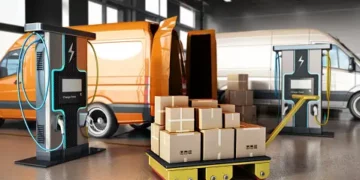The transport, logistics, and warehousing sector, pivotal for various businesses, has seen remarkable growth in the UK, according to Office of National Statistics data, expanding by 88% in the decade leading to 2021, with a notable 21% growth from 2019 to 2021. This surge, attributed to the impacts of Brexit and the COVID-19 pandemic, has not shown signs of abating post-pandemic, leading to increased attention on the sector’s emissions and sustainability practices.
Notable Developments from Industry Leaders Amazon, a leader in retail, is moving towards a greener fleet, aiming to replace its delivery vehicles with over 100,000 electric ones by 2030. However, issues such as a lack of charging infrastructure, as witnessed with Amazon’s electric vans in Glasgow, highlight the importance of supporting energy infrastructure for a successful transition away from fossil fuels.
Market Dynamics and Sustainability There’s a shift in how businesses and consumers perceive sustainability; it’s becoming a defining factor for success and brand value. Companies are scrutinizing their supply chains more rigorously, with post-COP26 consumers showing increased awareness of environmental impacts. Brands like Lush and Primark are incorporating sustainability into their business models, which, in turn, affects the freight and logistics services that support them.
Emissions Transparency and the “Last Mile” Challenge Transport remains the largest emitter of greenhouse gases, with road transport contributing significantly. The rise of last-mile delivery services, like Evri and Yodel, has introduced additional complexity in measuring the sector’s carbon footprint due to the varied types of vehicles used, which often do not meet specific environmental standards.
Decarbonizing Freight and Logistics Decarbonizing the freight and logistics industry requires substantial changes in practice, resource utilization, and technology, alongside investments in new vehicles and infrastructure. While large corporations may find it easier to adapt, smaller and regional logistics providers must innovate to remain viable in a traditionally structured industry. Initiatives such as the e-walkers in Dublin City exemplify such innovation by offering zero-emission delivery solutions.
Collaborative Efforts and Business Model Innovation Addressing climate change may involve rethinking traditional business models. One proposition is for suppliers to pool delivery resources, which could streamline operations, reduce distances traveled, and lower costs. New business models, like “delivery as a service,” could emerge, allowing businesses to provide efficient deliveries while committing to decarbonization.
The New Sustainable Mindset in Business Strategy Arup suggests that sustainability can drive efficiency across all business facets, making it a core component of a robust business strategy. The principles of adopting sustainability as default, staying in tune with consumer sentiments on environmental issues, and maintaining flexibility in business strategy are becoming increasingly vital for the success of businesses in this transitioning sector.
These insights reflect the critical phase of transformation that the freight and logistics sector is undergoing, emphasizing the balance between operational excellence and sustainability commitments in shaping the future of the industry.
Find the latest updates in supply chain logistics news at The Supply Chain Report. Visit ADAMftd.com for free international trade tools.
#TransportLogistics #WarehousingGrowth #SustainableLogistics #GreenFleet #ElectricVehicles #AmazonSustainability #EnergyInfrastructure #SustainabilityShift #EnvironmentalAwareness #SupplyChainSustainability #LastMileChallenge #CarbonFootprint #DecarbonizeLogistics #InnovationInLogistics #EWalkers #ZeroEmissionDelivery #BusinessModelInnovation #DeliveryAsAService #SustainableBusiness #COP26Impact #FreightAndLogistics #EmissionsTransparency #SustainableTransport #LogisticsGrowth #PostPandemicEconomy #GreenBusinessStrategy #FlexibilityInBusiness #ArupSustainability















